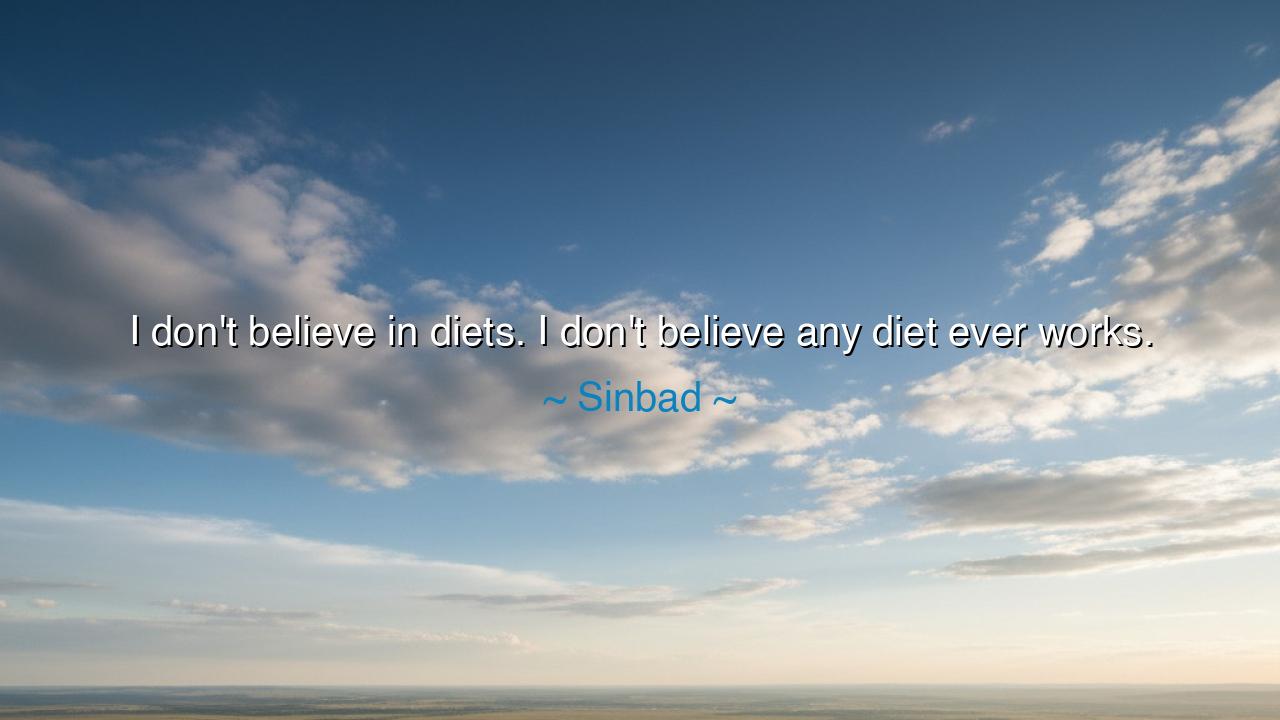
I don't believe in diets. I don't believe any diet ever works.






"I don't believe in diets. I don't believe any diet ever works." These words, spoken by Sinbad, strike at the heart of a timeless truth: that discipline, balance, and long-term commitment are the true keys to health and well-being, not fleeting or restrictive measures that promise quick fixes. Sinbad’s skepticism about diets speaks to a deeper understanding of the nature of human life—a life in which true transformation is not achieved through short-term solutions, but through a sustainable, holistic approach to how we care for our bodies. The idea of the diet, often marketed as the ultimate remedy for physical and mental struggles, lacks the depth of wisdom that comes with understanding the balance of life itself.
In ancient times, the philosophers and healers of the world understood that the body, like the mind and soul, requires long-term nourishment and care. Hippocrates, often called the father of medicine, spoke of balance as the foundation of health, teaching that the human body thrives not on temporary extremes, but on consistent nourishment and holistic well-being. For Hippocrates, true healing came not from quick fixes or drastic diets, but from understanding the body’s natural rhythms and feeding it with the right combination of simplicity and moderation. Sinbad’s rejection of diets echoes this ancient wisdom—diets are a short-term answer to a problem that requires a much deeper, more profound shift in how we relate to food, exercise, and life.
Consider the example of the Spartans, the legendary warriors of ancient Greece. Their strength, endurance, and resilience were not achieved through temporary measures or extreme diets, but through rigorous discipline in all areas of life—diet, training, and mindset. The Spartan diet was simple and focused on what the body needed to maintain its strength and vitality. It was not about deprivation or indulgence, but about nourishment and sustainability. Like Sinbad’s words, the Spartans knew that true strength comes not from restrictive diets, but from a life lived in harmony with the body’s natural needs, consistently cared for and nourished over time.
In the same vein, the ancient Romans emphasized the importance of moderation and self-discipline in their approach to food. Cicero, the Roman philosopher, wrote extensively on the need for balance in all aspects of life, including diet. He believed that excess in food and drink led to mental and physical weakness, while moderation in consumption contributed to a clear mind and a strong body. The Romans, though known for their indulgent feasts, recognized the importance of discipline in their daily habits. Sinbad’s rejection of diets reflects this ancient principle: true vitality is not achieved by extremes, but by a steady commitment to balance and long-term well-being.
The ancient Stoics also embraced the idea that true strength and health come from living in accordance with nature’s laws, rather than seeking out shortcuts or momentary pleasures. Marcus Aurelius, the Roman Emperor and Stoic philosopher, spoke often of the need for self-control and moderation in the pursuit of wisdom and inner peace. The Stoics believed that lasting happiness and health were achieved by cultivating virtue—living simply, choosing what is necessary, and rejecting the temptations of excess. Sinbad’s rejection of diets is a Stoic viewpoint: a diet that promises immediate results but is unsustainable is a distraction from the deeper, more fulfilling path of balanced living.
The lesson in Sinbad’s words is clear: diets, while promising quick results, do not provide the lasting changes we seek. They are temporary, external solutions that often ignore the deeper, more holistic needs of the body and mind. The true path to health and well-being is one of consistency, discipline, and self-awareness. It is not about depriving ourselves or following restrictive rules, but about learning to nourish the body in a way that supports its natural rhythms. This involves embracing balance—not just in food, but in all areas of life, including exercise, rest, and mental clarity.
In practical terms, Sinbad’s rejection of diets invites us to consider a more sustainable, long-term approach to health. It challenges us to reflect on our habits and lifestyles, and to make choices that nourish our bodies for the long run, rather than seeking quick fixes. Moderation in diet, combined with regular physical activity, mental clarity, and self-reflection, is the key to true health and vitality. Like the ancient philosophers and warriors, we must commit to daily habits that support balance and enduring well-being, instead of falling into the trap of fad diets and temporary measures.
Thus, let us take Sinbad’s words and the ancient wisdom to heart. Let us reject the allure of fleeting diets and instead embrace the path of balance, discipline, and self-care. Let us nourish our bodies with the foods that provide long-term health, exercise our bodies with consistency, and cultivate a mind that is focused and clear. Through this holistic approach, we will achieve lasting health, not through extremes, but through steady, intentional living—just as the great philosophers, warriors, and leaders of the ancient world did before us.






AAdministratorAdministrator
Welcome, honored guests. Please leave a comment, we will respond soon